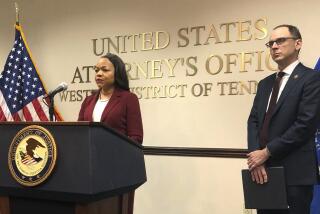Loretta Lynch confirmed as attorney general; tough challenges await
Loretta Lynch, who won Senate confirmation Thursday to become the next U.S. attorney general, is taking over the Justice Department amid a national uproar over alleged police brutality that could largely define her tenure.
The first African American woman to serve as the nation’s top law enforcement officer arrives at a time of unprecedented public pressure for federal officials to respond to the growing list of confrontations between local-level police and unarmed citizens, many in racially charged circumstances.
The Justice Department announced Tuesday it was investigating last week’s death in Baltimore of Freddie Gray, who died of a broken spine after being taken into police custody, the latest in a series of such controversies since the fatal Aug. 9 shooting of Michael Brown in Ferguson, Mo.
As a longtime federal prosecutor who has put cops in jail, yet also is a favorite of the law enforcement establishment, Lynch brings credibility to the issue that few others could muster.
“She is in a good position because she has earned credibility with the law enforcement community to begin with,” said James M. Cole, who served as deputy attorney general until January.
President Obama on Thursday praised Lynch’s record, calling her “a tough, independent and well-respected prosecutor on key, bipartisan priorities like criminal justice reform.”
But even Lynch — approved by a narrow 56-43 Senate vote — will find it hard to address the mounting public demands for action against rogue cops while still maintaining the faith of the 113,000 prosecutors, prison guards and FBI and DEA agents under her charge.
“That’s her first and maybe biggest challenge, because if you can’t get the law enforcement community to buy into your programs or your reforms, they don’t happen,” said Seth Stoughton, a former policeman in Tallahassee, Fla., who teaches law at the University of South Carolina.
As a new member of the Obama administration, Lynch will no doubt inherit some of the baggage of her predecessor, Eric H. Holder Jr.
“Many in the law enforcement community have already developed an opinion of the Obama administration as anti-police,” Stoughton said. “With Miss Lynch being appointed as part of that administration, she already has a hurdle to overcome to get the trust of law enforcement.”
Holder was heavily criticized by police for making critical public comments about the Ferguson Police Department after Brown’s death.
As a newcomer, Lynch has an opportunity to make a fresh start on the issue.
She seemed to send a strong signal in January that she would be different, emphasizing her respect for law enforcement groups.
“Throughout my career as a prosecutor, it has been my honor to work hand in hand with dedicated law enforcement officers and agents who risk their lives every day in the protection of the communities we all serve,” Lynch said in her opening statement to the Senate Judiciary Committee. “Few things have pained me more than the recent reports of tension and division between law enforcement and the communities we serve.”
But as Lynch knows, there are limits to the prosecutorial tools at her disposal to deal with the issue.
The sharpest tool is to file criminal civil rights charges against police officers who cross the line, as the department did in the case of the 1992 beating of Rodney King by Los Angeles police officers.
But that is also the hardest instrument to wield effectively because the legal bar to prove a criminal civil rights violation is high, particularly in cases involving police.
One of her first prosecutorial decisions involving police could be in a case she knows well. As U.S. attorney for Brooklyn, she led the federal civil rights investigation into the death of Eric Garner on Staten Island, N.Y., last year after police apparently placed him in a chokehold.
Now, as attorney general she will make the final call on whether to charge the police officers involved.
Justice Department officials say that an indictment in the Garner case is more likely than other prominent cases in part because the incident that resulted in his death was videotaped.
But it will still be a tough decision for the new boss because the government must prove the police officers willfully deprived Garner of his rights.
The latest case is one pending against the city of Ferguson after a Justice Department finding of systematic civil rights abuses by the police and the local courts. Lynch will have to either accept a negotiated settlement with the city or sue in federal court.
Lynch had plenty of experience with police brutality before the Garner case. The biggest feather in her prosecutorial cap in Brooklyn was the conviction of New York City Police Officer Justin Volpe in 1999 for forcibly sodomizing Haitian immigrant Abner Louima with a broom handle while in custody.
But errant police will be only one of many thorny issues on Lynch’s agenda. Cole, the department’s former No. 2, said that among them is the reauthorization of the post-Sept. 11 Patriot Act, a section of which has been used to authorize National Security Agency collection of Americans’ telephone call records. That provision is due to expire in June.
Cole said Lynch would also take over responsibility for the department’s investigation into whether Internal Revenue Service officials violated any laws when they targeted political groups seeking tax-exempt status. Other Justice Department officials mentioned the ongoing investigation into alleged manipulation of patient data by officials in the Veterans Administration.
The soft-spoken Lynch is likely to have an easier time dealing with Congress than Holder, who was known for his clashes with Republicans and was held in contempt of Congress after lawmakers complained he withheld information they demanded.
But in a sign that she won’t have much of a honeymoon, most Republicans voted against her Thursday, despite praising her credentials. They blamed Lynch for expressing support for Obama’s immigration executive actions during her confirmation hearing. She waited more than five months for confirmation, one of the longest delays ever for an attorney general nominee.
“I wanted to see a new attorney general who would be faithful to law, but her answers made that impossible,” said Sen. Ted Cruz of Texas, a Republican presidential candidate who returned to Washington from the campaign trail to denounce Lynch on Thursday, but then left without voting on her confirmation.
tim.phelps@latimes.com
Twitter: @timphelpsLAT
More to Read
Start your day right
Sign up for Essential California for news, features and recommendations from the L.A. Times and beyond in your inbox six days a week.
You may occasionally receive promotional content from the Los Angeles Times.







